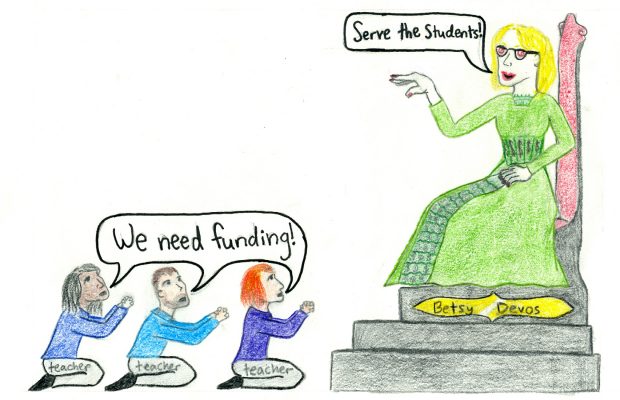Teachers deserve better treatment

After years of mistreating teachers, the government has the audacity to be surprised when they demand better conditions. If we expect our student body to receive a quality education, the government needs to take a moment, evaluate itself and realize that doing the bare minimum does absolutely nothing to fix problems. There is a solution: supporting our teachers. Our teachers needs to be a priority at every level of the government, starting with our local school districts.
In the last two months, West Virginia, Arizona, Kentucky and most recently and prominently, Oklahoma, have seen widespread strikes as teachers take a stand against unfair wages, disgraceful work environments and minimal funding for their students’ education. Secretary of Education Betsy DeVos responded in retaliation: “Serve the students.” DeVos and our district have something in common: a disconnect from reality.
Without proper funding and wages, however, it becomes harder for teachers to serve the students. Teachers are the most integral part of our education, but they are compensated and treated in a way that disregards the necessity of the job and the effort it requires. Although this nationwide problem is more severe in states with lower education funding, the same issues are evident in the Conejo Valley Unified School District (CVUSD).
According to the CVUSD website, the average salary of a teacher at Newbury Park High School (NPHS) is $64,161, which is almost $15,000 less than the average salary of a teacher in the state of California ($77,129 according to the LA Times). In CVUSD, the average teacher is paid $78,911, which means that the average salary for NPHS is 20.6 percent less than even an average teacher at another CVUSD school.
Many teachers buy supplies for their classes out of their own budgets. Some have even bought entire class sets of books for their students. Art teachers have been requesting additional supplies and updates to their classrooms for years, and have resorted to donations in order to pay. The art budget has not changed since the 1970s. Teachers should not have to worry about their students lacking the supplies they need. To mitigate this issue, we need to modernize school funding.
Another issue our teachers face is unrealistic class sizes. Class distributions are completely disproportionate, with some teachers teaching multiple classes of around 40 students while others teach significantly smaller classes. However, both teachers could be making the same salary. On top of this, teachers are expected to teach multiple different subjects, each requiring its own time for preparation.
The district exacerbates this problem, ignoring the teachers’ requests for better class distribution and smaller class sizes. Technically, the district rule states that 38 students is the majority in any class; however, 5 percent of classes are allowed to have up to 42 students and a teacher can only have one class at that capacity. Theory of Knowledge classes are filled with around 30 students, even though they are only supposed to have around 15. To mediate this, teachers offered to teach an additional class period, however, the district denied this request. In doing so, the district has impaired the learning environment by undermining the teacher’s ability to foster class discussions where everyone can participate. The district needs to listen to these requests; teachers are the ones in the classroom– they are the ones that have personal knowledge of classroom dynamics.
IB teachers are expected to take on an immense amount of work that is compounded by the large class sizes, and that work is not reflected in their salaries. The district only offers a meager stipend of $400 for IB teachers. Before they even start teaching the classes, teachers must attend extensive and time-consuming training workshops and sessions. Their jobs require them to commit wholeheartedly to hours of additional work to assess and teach their lessons.
For example, some IB science teachers wake up hours earlier every day to grade IB labs, but it still takes them months to get through all of their students’ work. IB English teachers have to grade lengthy Written Tasks and FOAs on top of regular assignments. IB Arts teachers are tasked with conferencing with each student about their individual work. IB Language teachers have to juggle teaching their class, showing students how to write the different IB papers and then find the time to practice for the oral exam.
In fact, the circumstances in our district have been one factor urging teachers to resign and seek jobs in other districts. Teachers are one of the most important parts of our society, and we cannot keep taking them for granted.
As a society, we need to start valuing our teachers more. Education funding should be a priority at the local, state and federal level.
It is imperative we start treating teachers in a way that respects and acknowledges the magnitude of their jobs. We are not accusing any specific group of people as a scapegoat for these issues, we are simply trying to show why we need to improve the current conditions. While we may not deal with books, computers and supplies outdating the students by decades like Oklahoma school districts do, our district still needs to introduce changes where teachers are concerned. We cannot keep disenfranchising teachers in their own classrooms and expecting them to accommodate every time.


